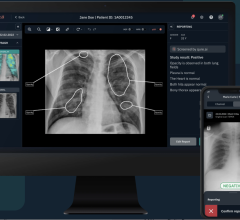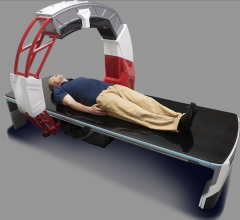
Gigi, a western lowland gorilla at Fanklin Park Zoo (Boston), recently underwent a computed tomography (CT) scan as part of efforts to identify the cause of ongoing health issues in recent months. Image courtesy of Zoo New England
May 6, 2019 — Gigi, a western lowland gorilla, was recently put under anesthesia at Franklin Park Zoo (Boston) so the zoo’s veterinary staff could examine her and perform further diagnostics, including a computed tomography (CT) scan, in the hopes of identifying the cause of recent health issues.
At 46 years old, Gigi is the oldest member of the gorilla troop at Franklin Park Zoo, and among the oldest gorillas living within the North American population managed by the Association of Zoos and Aquariums. Gigi has been off-exhibit for the past few months due to ongoing health issues that have included a urinary tract infection and changes in energy, mobility and appetite.
Bloodwork obtained during an exam in late March revealed elevated biliary enzymes and elevated kidney values, both of which are generally non-specific as to cause, but could be indicative of an underlying issue with her gall bladder and kidneys. Further diagnostics, including the CT scan and a liver biopsy, will be performed to try to more specifically determine the cause of her recent health issues and abnormal laboratory values.
“The veterinary and animal care teams take extraordinary care of our geriatric animals to ensure that they enjoy a healthy and comfortable life as they age. While we have been able to closely monitor Gigi’s health through our well-established training program, tomorrow’s exam will provide a more comprehensive view of her overall health and may inform our care plans moving forward,” said Eric Baitchman, DVM, Zoo New England vice president of animal health and conservation. “We are incredibly grateful to NeuroLogica for so generously providing the CT scanner for this exam as this will assist our staff immensely in providing the best possible care.”
The CT scanner being used in Gigi’s procedure is NeuroLogica’s BodyTom, a battery-powered, portable, 32-slice CT scanner. The portable scanner was chosen because the process of moving the gorilla to an offsite hospital or imaging center would have been too complicated.
Whenever anesthesia is administered there is always a risk to the animal and people involved in the procedure.
“Any animal immobilization involving general anesthesia always carries some risk. We never enter into these procedures lightly and every possible effort is made to keep the animal, as well as the people involved in the procedure, safe and healthy,” said Baitchman.
The exam is expected to last at least three hours.
During her time off exhibit, her care staff is working diligently to monitor Gigi’s behavior, administer medications and work on improving her food consumption, while doting on her constantly with some of her favorite enrichment. Gigi’s favorite enrichment items include blankets, which she is often spotted carrying and making “nests” with, and food treats including banana peels, grapes, celery, oatmeal, escarole and yogurt – which her care staff have been using to help administer her medication. In addition to being an enjoyable snack, the yogurt also contains important probiotics, protein, and calories for Gigi.
For more information: www.zoonewengland.org
Related Content
Black Rhinoceros at Brookfield Zoo Undergoes Portable CT Scan
Suburban Illinois Zoo Now Home to Largest CT Scanner in Zoo Setting


 August 09, 2024
August 09, 2024 








